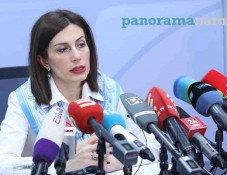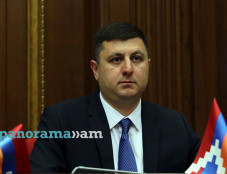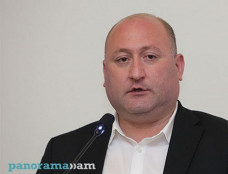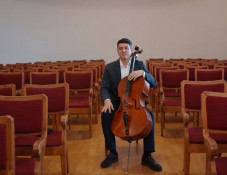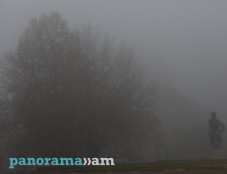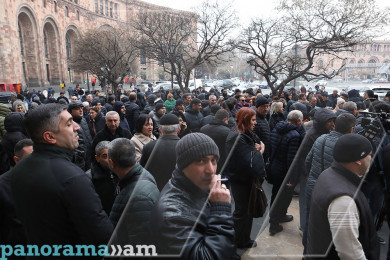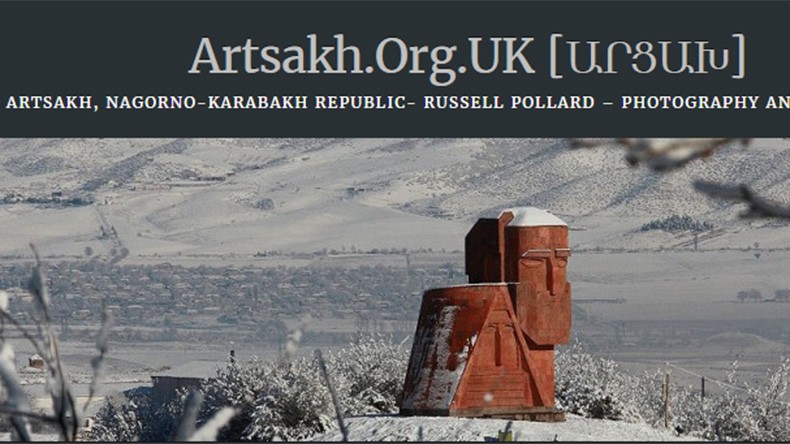
British journalist: Recognition of NKR and sanctions against Azerbaijan is only solution to Nagorno-Karabakh conflict
If Azerbaijan ever occupied the Nagorno Karabakh Republic (NKR)/Artsakh by force, as it tried to do by launching a military offensive on 02-05 April, Artsakh “would be subject to ethnic cleansing on a wide scale”. Therefore, the formal international recognition of NKR, backed up by the threat of sanctions against Azerbaijan, is the only measure that will make the required shift in the dynamics of the conflict and deter any future aggression. This is the opinion of British independent journalist, photographer and writer Russell Pollard, who has visited the NKR/Artsakh more than 10 times, is well familiar with the life of the Karabakh Armenians, the realities of the NKR and the conflict on the ground, and has has portrayed it all with photos on his website.
In an exclusive interview with Nvard Chalikyan from Panorama.am Russell Pollard also noted that the coverage of Azerbaijan’s recent aggression on the Nagorno Karabakh Republic (NKR) in the UK media was scarce, biased and used out-of-date terminology that reinforces inaccurate stereotypes. “The [media] narrative needs to be focused on the human rights of the 150,000 citizens of the Nagorno Karabakh Republic (Artsakh) who simply want to have a normal life and to be able to live in peace… NKR is not about a war, it is about people who have lived in adversity for decades, and who continue to thrive despite this - there is a great human story to be told”, – he said.
Below is the full interview with Russell Pollard.
Nvard Chalikyan: On April 2-5 Azerbaijan launched a full-scale military attack on the Nagorno Karabakh Republic (Artsakh) which was in line with Azerbaijan’s previous statements of using force to conquer NKR. As someone who has been in Artsakh many times and is familiar with the conflict on the ground, how can you interpret Azerbaijan's actions and the recent escalation?
Russell Pollard: The cease-fire has been relatively stable for 22 years. It is not in the interests of the people and Government of NKR to change the military situation as, whilst ever there is peace, there is hope, and a future. The position of Azerbaijan is diametrically opposite, and the prolongation of the ceasefire seems to drive a more entrenched and ideological perspective on the situation. This is conflated by an irrational need to “take back” Karabakh without any obvious geo-political value, or concern for the welfare of the Armenians living there.
Over the last few years as the oil price has dropped, there has been an increased level of international exposure to the questionable practices of the Aliyev regime, and a general disquiet amongst the people of Azerbaijan. The fact that this led to a significant escalation seemed inevitable as Aliyev tried to divert attention away from his internal activities. It felt like the actions of a desperate man.
The first “false ceasefire”, the short-term territorial gains, then losses, and a renewal of the ceasefire after 3 days, implied to me that there was a serious error of judgement on Aliyev’s part. The significant defence spending did not translate into military superiority, which I’m sure came as a surprise to many people in Azerbaijan.
N.C.: Azerbaijan claims Nagorno Karabakh is their territory, while it is a historical fact that Nagorno Karabakh is an indigenous Armenian land, much older than Azerbaijan itself. What was your impression of the land of Artsakh when you visited?
Russell Pollard: There are many Armenian churches throughout NKR which are not recent builds which confirms that Armenians have lived there for centuries. Historically, Azerbaijanis did live in regions of the current NKR prior to the war, and whilst this might have been relevant 25 years ago, I don’t believe that this is a factor in considering the future in 2016.
N.C.: What do you think would happen with Karabakh Armenians should Azerbaijan succeed in its plans to conquer NKR or as they misleadingly put it, to “take it back”?
Russell Pollard: NKR was never part of an independent Azerbaijan so there is not a question of it being “taken back”. If Azerbaijan occupies NKR by force, then there will be no future for Karabakh Armenians in those lands. All of the existing state infrastructure would be removed, and replaced by a much more authoritarian regime which will not be sympathetic to the Armenian population. The country will be subject to ethnic cleansing on a wide scale.
N.C.: You have noted before that the only option for the solution of the Nagorno-Karabakh conflict is the recognition of the NKR. Given Azerbaijan's intentions and actions don't you think the international recognition of NKR will serve as a deterrent against future aggression of Azerbaijan?
Russell Pollard: Conflicts such as this will only be solved by the bold and brave actions of individuals. It will not be solved by the international community compromising every principle it has to avoid the smallest risk of upsetting nations who don’t deserve that level of respect. A modern, humanitarian world is democratic; the self-determination of people is a fundamental aspect of that. An approach based on territorial integrity which is contrary to the will of the people, is medieval.
Formal international recognition, backed up by the threat of sanctions, is the only measure that will make the required shift in the dynamics of the conflict and deter any future aggression. Continuing with the same impotent committees and bland politics that have been the only options for the last 22 years is no solution, and will not prevent future escalations.
N.C.: What is your opinion of the coverage of the recent escalation of the Nagorno-Karabakh conflict in the international media in general and in the British media in particular?
Russell Pollard: I can only really comment on the British media. There was no coverage of any consequence in the mainstream media and no one I spoke to was aware that the conflict had re-started even though they were aware of NKR from my involvement. I’m afraid to say that the Caucasus is too far away, and too much of an unknown problem, for it to be considered a priority in the UK media. Also other major conflicts, together with local matters consume the available media space. The few reports I read on the internet from the national TV station were brief, biased, and using terminology like “separatist”, “breakaway”, “enclave” etc. that are 25 years out of date and that only serve to reinforce a confused, and inaccurate stereotype. An objective impression one would get from this reporting is of a highly militarised group of bandits living in a state-less structure constantly in conflict with Azerbaijan.
N.C.: What would you say the true state of affairs is? What would be an accurate presentation of the reality of the Nagorno-Karabakh Republic and of this conflict in the media?
Russell Pollard: The media presentation is very backward looking and concentrates far too much on why the original war started and does not clarify the ambiguity of the last months and years of the Soviet Union. The point of history that should be emphasised is that the Nagorno-Karabakh Republic became independent from the Soviet Union before it collapsed and was never part of an independent sovereign Azerbaijan. Now, this is simply about the self-determination of the people of NKR.It is important for people to know that NKR is a state under the definition of the Montevideo convention, namely – it has permanent population, defined territory, a government, and the capacity to enter into relations with other states. People should be aware of the high population of young people in the country (born since the 1994 cease-fire) who are being educated at all levels, with a number of Universities, including an active Youth Ministry, and NGO structure, developments in industry and agriculture, IT and telecommunications, infrastructure, arts and culture. This is despite being under economic constraints by the lack of recognition and the constant threat of attack by Azerbaijan. The narrative needs to be focused on the human rights of the 150,000 citizens who simply want to have a normal life and to be able to live in peace, the majority of whom were born in those lands.In my opinion, NKR is a safe place to live. The level of violent crime committed from within is negligible compared to the UK. The only safety concerns are from Azerbaijan. Any future must be mindful of its security and must assure the protection of the people of NKR. The recent flare up reaffirms this risk, and demonstrates why the buffer zones are critical to the defence policy.NKR, like any country has many very positive attributes, and to suggest that it is solely defined by the war with Azerbaijan is narrow-minded lazy journalism. Too many journalists want to sensationalise, and to concentrate on "exposing" the well-trodden aspects of the past. NKR is not about a war, it is about people who have lived in adversity for decades, and who continue to thrive despite this – there is a great human story to be told!
Interview by Nvard Chalikyan
Related news
- Hans-Juergen Zahorka: It was grave mistake that EU didn’t take Azerbaijan’s war talk seriously
- MEP Eleni Theocharous condemns Azerbaijan’s military actions against Karabakh and calls for international response
- Russell Pollard: The recognition of NKR within current borders is the only humanitarian option
- British MP Steven Pound: Azerbaijan is a failed state
- Caroline Cox: Let’s not forget that Azerbaijan was aggressor in war; Karabakh can never accept Azerbaijan’s sovereignty!
- Bernard Coulie: Surrendering any territories to Azerbaijan is nonsense!
- Rouben Galichian on how Azerbaijan falsifies history
- Gérard-François Dumont: Neglecting historical facts makes solution of Karabakh conflict even harder
Newsfeed
Videos








